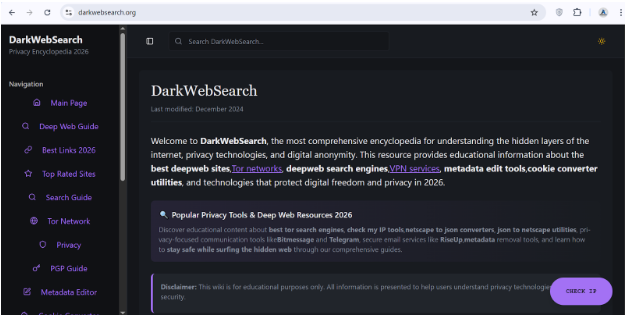Understanding the Deep Web and Darknet: Not Everything Hidden Is Bad
The internet we browse daily is just the surface. Beneath it lies the deep web, a vast space containing everything from academic databases to private files and unindexed portals. Most of it is completely legal and even essential—like your medical history or subscription accounts.
The dark web, however, is a small fraction of the deep web that requires special browsers like Tor to access. It’s a place of both mystery and utility. While some associate it with illegal marketplaces, many use it for anonymous communication, journalism, political dissent, or to bypass censorship.
Learning how to search darkweb content safely starts with understanding that not all parts of the dark web are malicious. Some of the most valuable conversations and innovations happen away from public search engines.
Best Deepweb Sites 2026 You Should Know About
As we move into 2026, new and more secure sites are emerging on the dark web. Whether you’re researching, protecting your identity, or exploring decentralized markets, these best deepweb sites 2026 are worth checking out.
1. Hidden Wiki
The Hidden Wiki remains the ultimate launchpad for finding other onion sites. It hosts deepweb links & URLs, which are sorted by category: forums, marketplaces, search engines, hosting services, etc. But be careful—some mirrors are outdated or scam-filled. Use updated versions from trusted sources only.
2. Ahmia & NotEvil
If you’re looking to search links on the deepweb, Ahmia and NotEvil are great tools. These engines let you type in what you’re looking for—like “cryptocurrency exchange” or “PGP chat”—and they return onion site results without exposing your identity.
3. Privacy Marketplaces
Several anonymous shops offer tools like VPNs, burner email services, metadata editors and removers, and even encrypted storage. These sites are ideal for journalists, researchers, and privacy enthusiasts.
These platforms form the core of the most popular deepweb sites 2026, offering utility beyond the criminal narrative.
How to Search the Darkweb Like a Pro
Ready to dive in? Here’s how you search darkweb spaces safely and effectively in 2026.
Use the Right Browser
Always start with Tor Browser. It’s open-source, heavily audited, and routes your traffic through random nodes. For extra security, try Tails OS—a bootable system that leaves no digital trace.
Choose Reliable Search Engines
You won’t be using Google here. Stick with NotEvil, Ahmia, Haystak, or Kilos. These search engines crawl the deepweb links & URLs and return results just like a surface-level search engine would—but anonymously.
Use Directories
Sites like the Hidden Wiki or Dark.fail keep updated lists of trusted onion links. They’re essential if you’re searching for darknet market links, forums, or secure file sharing portals.
By using these tools and techniques, even beginners can search the darkweb with a sense of direction and safety.
Privacy Essentials: Metadata Editor and Remover Tools
One of the biggest mistakes new users make when uploading files or images to the dark web is forgetting to clean up metadata. Every image, document, or video contains hidden information like your device ID, GPS coordinates, or software version.
This is where metadata editors and removers come in. These tools help you wipe your files clean before sharing or hosting. Many deepweb platforms recommend or even require using metadata cleaners as part of their community rules.
If you’re looking to host an onion site or send private documents, using a metadata scrubber is as important as encryption.
How to Host an Onion Site in 2026 (The Smart Way)
Curious about how to host an onion? It’s easier than ever—but privacy-first rules apply. Follow these smart steps:
Step 1: Get a Secure System
Use Tails or Whonix—both are secure operating systems designed for anonymity. Never use a personal laptop or work device for onion hosting.
Step 2: Install Tor and Configure Hidden Services
Download Tor and go into the torrc file. Here, you’ll add your domain configuration and choose which port to open. Once complete, Tor will generate a private key and a .onion address for your site.
Step 3: Upload Site Content
Design a minimal HTML page or use CMS tools that work with Tor. Before you upload, clean every file with a metadata editor and remover.
Step 4: Go Live and Share Carefully
Don’t post your site publicly right away. Use deepweb search engines or private sharing groups to spread your .onion link. Monitor traffic and logs (privately), and rotate hosting keys if needed.
Checking Your IP: Your First Line of Defense
If you’re not using a VPN or secure browser, you’re not anonymous. Even when using Tor, you should check my IP to verify whether your real IP is leaking.
Use tools like check.torproject.org or DNS leak test websites to confirm. Many users overlook this step and end up compromising their location—especially if they’re tracking crypto prices or using darknet market links without precautions.
Make “check my IP” your first and last step during every session.
Tracking Crypto Prices Anonymously on the Deep Web
Want real-time crypto prices without sharing your email or wallet? The dark web has you covered. Many onion-based tools track Bitcoin, Ethereum, Monero, and altcoins, without cookies, trackers, or location logs.
Why use deepweb tools?
- No KYC requirements
- Pure privacy—no JavaScript or pop-ups
- API-free, no cloud-based logging
- Community-verified coin stats and alerts
These tools make trading or investing completely anonymous—a huge win for privacy lovers in 2026.
FAQs
1. How is the deepweb different from the darkweb?
The deepweb is simply anything not indexed by Google, including your emails, bank accounts, and university portals. The darkweb is a deeper subset accessible only through specialized tools like Tor, where anonymity is prioritized.
2. Is it safe to use darknet market links?
Technically yes, but ethically and legally? Depends on what you’re accessing. Always use escrow, PGP encryption, and protect your metadata. Never enter personal info, and vet every vendor.
3. What are the best deepweb links & URLs to try in 2026?
Try the Hidden Wiki, NotEvil, Ahmia, and crypto price tracking platforms. These are some of the best deepweb sites 2026, offering both utility and anonymity.
4. How do metadata editors and removers protect me?
These tools erase embedded information in your files that could expose your device or location. They are critical for anyone uploading files or hosting content on the dark web.
5. Can I host an onion site without coding skills?
Yes! You can use HTML templates and follow guides on how to host an onion with tools like Tor + Tails. Just keep things minimal and metadata-free.



































